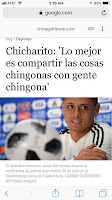 |
| Anabella at work at Fox for the 2018 FIFA World Cup. |
If you are like most sports fans, you've been busy watching the FIFA 2018 World Cup, right, dear readers? We've been watching as much as possible, even though our beloved Mexico lost to Brazil. One of the main reasons we are watching has nothing to do with football/soccer, and everything to do with interpreting. We have the pleasure of knowing several of the Los Angeles-based interpreters who were retained by an agency to interpret the interviews with players and coaches both before and after the matches (they get the feed from Russia). We have never interpreted on live television (and during one of the world's biggest sports events to boot!), so we cannot even begin to imagine how nerve-wrecking it would be. We had the chance to interview the Spanish interpreter for the World Cup, who worked for Fox through the above-mentioned interpreting agency. Anabella interpreted for several different countries and dozens of players of coaches for around 20 days. Judy has had the honor of sharing the interpreting booth and the courtroom with fellow federally certified interpreter Anabella Tidona, and without further ado, here's our interview with her.
Translation
Times: Congratulations on being one of the World Cup interpreters! How did you prepare for this assignment?
Anabella
Tidona: I was lucky that in the months leading to the tournament there were
over the phone interviews with some players, that allowed me to ease into the
subject. I would study each player’s career (which clubs he played for and in
what position, some career highlights) and also their national team: coaching
staff and teammates.
The
day before every match I would watch on the FIFATV channel on YouTube the
pre-match press conference that my team would do. The FIFA interpreters are of
exceptional quality and I sure learned from them too. The sound of the press
conferences is recorded in two channels, one ear for the original language and
the other ear for English interpretation. Be sure to listen with headsets to
decide what you want to hear. Speakers can be overwhelming.
 |
| Go Mexico! Photo by Anabella Tidona. |
Translation
Times: Can you walk us through the logistics of your daily work for this
assignment? Your call times were pretty early because of the time differences,
right?
Anabella Tidona: Yes, that’s correct. We would arrive two hours before the beginning of the
match and we would interpret the express interviews that the assistant coaches
would give right after the squads arrived to the stadium. The infrastructure is
amazing: many times we could see from a helicopter camera the bus with one of
the national teams going from their hotel to the stadium.
We
were also ready to interpret any half time interviews, although very few
coaches granted those, and post-match interviews. Post-match interviews happen
right after the ref blows the whistle. The players are still breathing hard
from running, and the adrenaline is still pumping from the match.
Translation
Times: Is it nerve-wrecking to be on live television? It would be for us.
Anabella
Tidona: Not nerve-wrecking, but certainly exciting. Some players and coaches
were predictable and some others surprised us with what they had to say!
Translation
Times: What were the most challenging parts of this assignment?
Anabella
Tidona: It’s pretty much live TV and there is no do-over. Post-match interviews
happen by the side of the pitch and the stadium background noise is still
there.
Translation
Times: What were the most rewarding parts of this assignment?
Anabella
Tidona: The behind the scenes people making this whole thing possible. Very
talented, hard-working and kind people. Everyone pulling together to make this
look (and sound) great on TV.
 |
| Interpret this! Photo by Anabella. |
Translation
Times: Who was your favorite player to interpret? Or coach?
Anabella
Tidona: Hirving Lozano (#22 Mexico) when he said the whole team busted their
asses training (“nos partimos la madre entrenando”). They actually aired it
like that.
Edinson
Cavani (#21 Uruguay) during the post-match interview after having scored 2
goals against Portugal was a bitter sweet moment, because he was top scorer at
that match but he left the pitch a few minutes before the game was over due to
a calf injury. He was very emotional because he knew he would not be able to
play the following match against France where they were finally eliminated.
Translation
Times: Did you come up with a particular solution that you were really proud of
that you’d like to share?
Anabella
Tidona: Really focus on the output,
really hear yourself speak, one ear uncovered. Most of us were doing Retour
into our English B, so we all tried our very best to sound good. Also, try to finish
quickly at the end of the interview, does not look pretty when the interviewee
walked away and the interpreter is still doing his or her rendition.
I
would also listen to the interviews I interpreted previously and try to analyze
what could be improved the following day.
Translation
Times: Did you have a booth partner?
Anabella Tidona: No, because
the interviews very short in duration. 2 minutes tops.
Many thanks for sharing your experiences with us, Anabella!
Anabella
Tidona is a Spanish interpreter based in Los Angeles, CA. Born and raised in
Buenos Aires, Argentina. She holds a degree in Political Science, a diploma in Conference
Interpreting and a Masters in Medical Translation. The U.S. gave her the
opportunity to forge her interpreting career and she has not stopped exploring
all the different facets of the profession: conferences, TV, legal and medical.






























